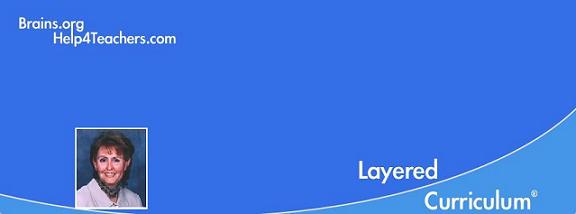__________Layered Curriculum®. . . because every child deserves a special education™_
SAMPLE Layered Curriculum Lessons ___||___
BOOKS
& Training Kits ___||___
TIPS from teachers
___||___ Kathie's
CALENDAR___||___
HOW-TO ARTICLES & Videos
On-site
WORKSHOPS & Conferences
___||___ Kathie's
NEWSLETTER ___||___
Today's Hot Topics____||___
The PARENT'S Corner _||___
CONTACT Us & FAQ's
 |
![]() _
_ ![]()
Layered
Curriculum TEXT & WORKBOOK
Set
for only
$43.95
(free shipping in
US)
Teaching Reading
Nanci Ross
2003
The Components of Effective Reading Instruction
Research in the fields of education psychology have shown that the following skills are critical to learning to read proficiently:
Phonemic awareness
Letter-word correspondence
Fluent word recognition
Vocabulary
Comprehension skills
Appreciation of literature
For strong reading fluency, the research supports having a child develop good phonemic awareness skills first, then addressing the other five reading components. Students learn to read most proficiently and quickly when all these skills are taught at the same time rather than sequentially.
From Learning to Read to Reading to Learn
The reading skill level achieved by the end of the third grade must prepare students for the literacy shift that they will encounter in the 4th grade. For it is in the 4th grade that students make a major transition from learning to read to reading to learn. This requires that students be automatic or fluent readers in order to understand narrative and expository texts.
Students in 4th grade are expected to read for the sake and enjoyment of reading as well as information. Teachers expect students at this grade to show:
Initial understanding of the text
Ability to develop an interpretation of the text
Personal reflection on the content and response to the content
Critical stance on the material
In addition, the words in a 4th grade text are not typically found in everyday language. Reading assignments become more technical and specific to the subject that they are studying. If students are not reading proficiently by the end of the 3rd grade, they will not have the skill basis for comprehending these more challenging texts. Their academic performance will suffer along with their reading enjoyment, causing both frustration for parents and student. Thus it is imperative to give students the best possible reading foundation as early as possible.
Nanci Ross is a reading specialist in Salt Lake City, Utah.
Copyright © 1998 - current year by Kathie F. Nunley.
All Rights Reserved.
Layered
Curriculum is a registered trademark developed by
Dr. Kathie F. Nunley.